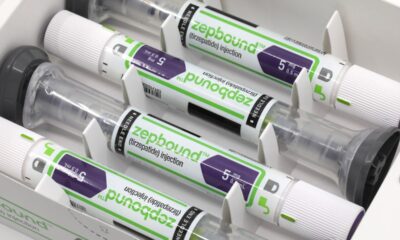Science
Scientists Develop Bioplastics from Agricultural Materials

Scientists have achieved a significant breakthrough in the fight against plastic pollution by developing bioplastics from common agricultural materials. This innovation, which has the potential to be “infinitely recyclable,” was made possible through a grant of $7 million from the U.S. National Science Foundation to a collaborative research group. The team includes experts from Purdue University, the University of California, Berkeley, Stanford University, and the biotech firm Twist Bioscience.
The newly created bioplastics, known as polyhydroxyalkanoates, can be produced using readily available materials such as sugar, corn, and agricultural waste. These resources are abundant in the United States, where they can significantly reduce reliance on imported oils and gases currently used in plastic manufacturing. This shift not only aims to lower production costs but also has the potential to enhance the economy by utilizing domestic materials.
Karthik Sankaranarayanan, an assistant professor of agricultural and biological engineering at Purdue University, highlighted the advantages of polyhydroxyalkanoates, stating that they maintain mechanical strength while being “infinitely recyclable.” Despite their promise, the technology requires further refinement before widespread adoption can occur. Polyhydroxyalkanoates have existed for some time but have faced challenges due to fragility at high temperatures. The research team is focused on improving these properties to enable their use in a variety of products, including medical devices and packaging materials.
Addressing Global Plastic Waste
According to the International Union for Conservation of Nature, more than 507 million tons of plastic are produced each year. Reports from The Last Beach Cleanup and Beyond Plastics, in collaboration with the National Renewable Energy Laboratory, indicate that only 5% of plastic is recycled. Approximately 85% of plastic waste ends up in landfills, while 10% is incinerated, contributing to environmental pollution and contaminating air, soil, and water.
Traditional plastic products also fragment into microplastics, which pose serious risks to ecosystems and human health. These tiny particles have been found in oceans, air, drinking water, and even human organs. The development of bioplastics has the potential to mitigate the microplastics problem, thereby fostering a cleaner environment. Furthermore, the use of domestically sourced materials could lead to lower prices for consumers, while reducing the need for oil and gas extraction, which exacerbates pollution.
Emily Leproust, CEO and co-founder of Twist Bioscience, expressed optimism about the collaboration with Purdue University, stating, “Working with Purdue elucidates real-world applications of complex sequences, which allows Twist to further advance our ability to manufacture difficult and previously hard-to-make sequences at scale, turning what was once considered difficult into routine.”
Next Steps for Commercialization
The research team at Purdue plans to develop algorithms for selecting the appropriate enzymes needed for production. They will also analyze reaction speeds and molecular structures to enhance the efficiency of the bioplastics manufacturing process. Researchers at the University of California, Berkeley, are exploring methods to scale up production, preparing for potential commercialization of the bioplastics.
The collaborative efforts among these institutions signify a promising advancement in the development of environmentally friendly plastics. As the project progresses, the team hopes to see the enzyme design implemented into practical applications, contributing to a sustainable future in plastic production.
-

 Science1 month ago
Science1 month agoNostradamus’ 2026 Predictions: Star Death and Dark Events Loom
-

 Technology2 months ago
Technology2 months agoOpenAI to Implement Age Verification for ChatGPT by December 2025
-

 Technology7 months ago
Technology7 months agoDiscover the Top 10 Calorie Counting Apps of 2025
-

 Health5 months ago
Health5 months agoBella Hadid Shares Health Update After Treatment for Lyme Disease
-

 Health5 months ago
Health5 months agoAnalysts Project Stronger Growth for Apple’s iPhone 17 Lineup
-

 Technology5 months ago
Technology5 months agoElectric Moto Influencer Surronster Arrested in Tijuana
-

 Education5 months ago
Education5 months agoHarvard Secures Court Victory Over Federal Funding Cuts
-

 Health5 months ago
Health5 months agoErin Bates Shares Recovery Update Following Sepsis Complications
-

 Technology7 months ago
Technology7 months agoMeta Initiates $60B AI Data Center Expansion, Starting in Ohio
-

 Technology6 months ago
Technology6 months agoDiscover How to Reverse Image Search Using ChatGPT Effortlessly
-

 Science4 months ago
Science4 months agoStarship V3 Set for 2026 Launch After Successful Final Test of Version 2
-

 Technology7 months ago
Technology7 months agoRecovering a Suspended TikTok Account: A Step-by-Step Guide



















